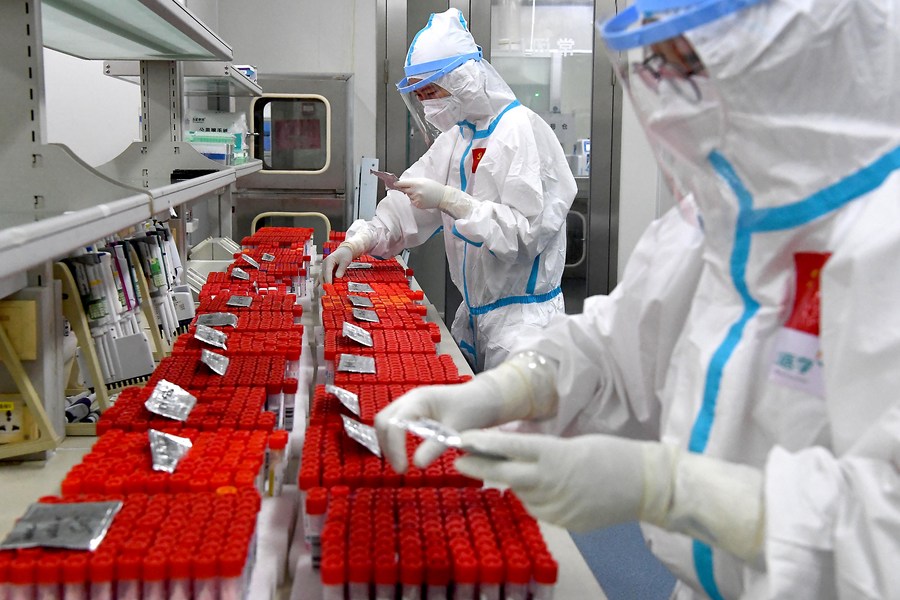Health authority urges efforts to contain hospital-acquired COVID-19 infections
Hospitals designated to receive COVID-19 patients must treat them in separate buildings in strictly segmented areas, China's top health authority recently said in response to the emergence of a series of hospital-acquired infections.
Hospitals designated to receive COVID-19 patients must treat them in separate buildings in strictly segmented areas, China's top health authority recently said in response to the emergence of a series of hospital-acquired infections.

Medical workers work in a lab for COVID-19 nucleic acid testing in Zhengzhou, capital of Central China's Henan province, Aug 11, 2021. [Photo/Xinhua]
Infected people, symptomatic and asymptomatic, must stay within areas that are completely isolated from the rest of the hospital in all aspects, including the flow of people, objects and air, the National Health Commission said in a notice released on Monday.
COVID-19 patients may not cross paths with or share medical equipment with other patients, it added.
If a local infection cluster occurs in a region, its designated hospital should empty out other patients and visitors within 24 hours, so that it is solely dedicated to treating and quarantining people infected with the novel coronavirus.
The document also requires designated hospitals to equip isolation wards with sufficient personnel specialized in preventing hospital-acquired infections and must stock sufficient anti-epidemic materials to maintain its operation at full capacity for 30 consecutive days.
All people working in isolated wards-including medical and management workers, security guards, cleaners and other support staff such as drivers who transfer patients-should be fully vaccinated before they first enter the wards. Local governments should arrange for them to live in single rooms at centralized places and keep them isolated from others.
Targeted training on personal protection and disinfection measures, as well as more frequent nucleic acid tests, will also be provided, it added.
Lesson learned
On July 31, a local cluster of infections broke out at the Sixth People's Hospital of Zhengzhou, in Henan province, triggered by an imported case of a person infected with the Delta variant who was being treated at the hospital, according to the National Health Commission.
The virus has since spread further to infect medical workers, cleaners, other patients and their family members or caretakers at the hospital, as well as some residents of other communities.
The city reported six new confirmed cases on Tuesday, bringing the total of confirmed infections since July 31 to 122. At least five other cities in Henan also registered sporadic cases linked to the Zhengzhou outbreak in recent days.
Guo Yanhong, of the National Health Commission's Bureau of Medical Administration, said at a news conference last week that the outbreak stemming from the hospital was due to local health authorities' poor understanding of the epidemic situation, and their inadequate supervision and implementation of measures to prevent hospital-acquired infections.
On Aug 5, Zhengzhou decided to set up another designated hospital for COVID-19 patients by refitting a branch of the Zhengzhou First People's Hospital located on the outskirts of the city.
As the commission has launched a nationwide campaign to step up oversight of procedures to prevent hospital-acquired infections, local medical facilities have taken action to beef up precautions.
Gao Xiaojun, a spokesman for the Beijing Health Commission, said at a news briefing that workers in key hospital departments in Beijing will be given one nucleic acid test per week and other workers will receive them every two weeks.
He added that health workers who have treated patients from medium to high-risk areas will be tested every three days for 14 days after contact.

